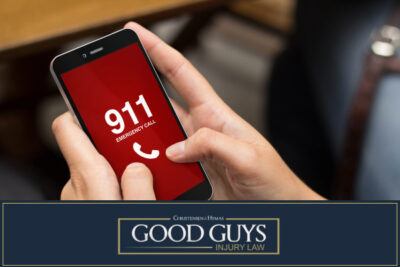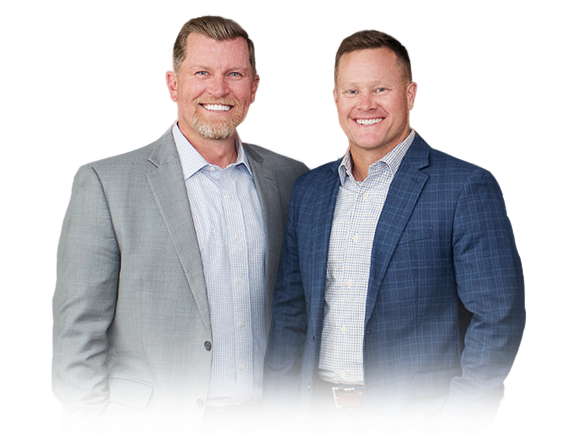 If you’ve been in a car accident in Utah involving American Family Insurance, it’s important to know what comes next. Whether you were hurt, lost wages, or had to repair your car, the claims process can feel confusing. Understanding how it works can make a big difference in getting what you’re owed.
If you’ve been in a car accident in Utah involving American Family Insurance, it’s important to know what comes next. Whether you were hurt, lost wages, or had to repair your car, the claims process can feel confusing. Understanding how it works can make a big difference in getting what you’re owed.
Good Guys Injury Law helps people across Utah with all types of personal injury claims. If you’re dealing with American Family Insurance, our team can explain your rights, review your insurance coverage, and help you fight for the fair compensation you deserve.
Whether it’s medical bills, car repairs, or pain and suffering, we guide you through the entire process from start to finish.
Table of Contents
Overview of American Family Insurance in Utah
American Family Insurance is a well-known insurance company in Utah. They provide coverage for car accidents and handle thousands of claims every year across the state.
What Kind of Coverage Do They Offer
American Family Insurance offers typical car insurance policies that include liability, collision, comprehensive, bodily injury, and personal injury protection (PIP). Some policies may include coverage for vehicle repair costs, rental cars, and future medical needs, depending on the plan.
They also provide coverage for both at-fault drivers and uninsured motorist claims. Policy limits can vary by contract and driver history.
How They Handle Car Accident Claims
American Family Insurance uses a step-by-step process to handle each car accident claim. Once a claim is filed, they assign an insurance adjuster who begins collecting facts about the accident scene, the drivers involved, and the damages.
This includes reviewing police reports, medical records, and repair estimates. They use this information to determine who was at fault and how much they should pay under the insurance coverage provided by the policy. After this investigation, the insurance company usually makes a settlement offer, which can be accepted, rejected, or negotiated further.
Why Policyholders and Injury Victims Should Understand Their Process
Both injured victims and American Family policyholders should understand how the insurance company works to protect themselves from mistakes. Knowing the process helps you avoid saying the wrong thing to an insurance adjuster, missing key deadlines, or accepting a low settlement payment.
It also allows you to provide the right documents, such as medical bills, photos of injuries, and repair estimates, to back up your personal injury claim. Understanding the system better prepares you to seek a fair settlement or know when to consult a personal injury lawyer.
What To Do After a Car Accident Involving an American Family Policyholder
 If you’re involved in a car crash with someone insured by American Family, the steps you take immediately after the accident can affect your health, your personal injury claim, and your chance of receiving a fair settlement. You must stay calm, gather important information, and protect your legal rights from the start.
If you’re involved in a car crash with someone insured by American Family, the steps you take immediately after the accident can affect your health, your personal injury claim, and your chance of receiving a fair settlement. You must stay calm, gather important information, and protect your legal rights from the start.
Call 911 and Get Medical Help
Right after the auto accident, your safety and health should come first. Call 911 to request emergency help, even if you think your injuries are minor, because some injuries, like whiplash or internal trauma, can take hours or days to appear.
Getting checked by a medical professional right away not only protects your health, but it also documents the link between the car accident and your injuries, which is essential for your personal injury case and any future medical bills you may face.
Gather Evidence at the Scene
If you are physically able to do so safely, start collecting important details at the accident scene. Take clear photos of all vehicles involved, visible damage, traffic signs, road conditions, and any visible injuries.
Get the name, phone number, license plate, and insurance coverage details of the other driver, especially if they are insured by American Family. This evidence supports your case and can become vital if there’s a dispute later during the claim status review or insurance adjuster investigation.
File a Police Report
Always make sure a police report is filed, no matter how minor the crash may seem. The responding officer will gather witness statements, record contact and insurance information, and document key facts about the crash.
This report is often the first official record of the incident and will be reviewed closely by both insurance companies when deciding who the at-fault driver was. Without a report, proving what happened becomes much harder in a personal injury lawsuit.
Report the Claim to American Family or Your Own Insurer
Don’t delay reporting the auto accident to American Family or your own insurance company, even if you’re unsure who was at fault. When reporting, give basic facts about the crash and avoid guessing or blaming others.
Your car accident attorney, if you have one, can help manage communication and make sure the right information is shared. Prompt reporting allows the insurance company to start their investigation, assign an insurance adjuster, and begin assessing vehicle repair costs, medical treatment expenses, and potential settlement amounts.
The American Family Insurance Claim and Settlement Process
After a car accident, filing an insurance claim with American Family is the first step toward receiving compensation. From start to finish, the company follows a detailed process that includes collecting evidence, reviewing damages, and deciding how much to offer.
Understanding how each step works can help you protect your rights and avoid common mistakes.
How to File a Claim
You can file a claim with American Family online, by phone, or through their mobile app. You’ll need your policy number, accident date, and contact and insurance information for all drivers involved. Make sure your statement includes accurate facts but avoid admitting fault.
After submitting the report, a claim number will be assigned, and you’ll be contacted by an insurance adjuster. Starting your claim quickly helps avoid delays in medical treatment, car repairs, and reimbursement for medical bills or vehicle repair costs related to the crash.
Investigation and Liability Review
Once your claim is filed, American Family will begin investigating to determine who was at fault. This review includes examining the accident scene, looking at the police report, speaking with witnesses, and reviewing vehicle damage.
The insurance adjuster will also interview both parties and request additional records as needed. Their goal is to decide whether the other driver, you, or both are liable. If the at-fault driver is clearly identified, this speeds up the process and affects how much the insurance company pays under the policy’s liability coverage.
Medical Records and Damage Assessment
To support your personal injury claim, the insurance company will request your medical records, bills, and treatment notes. They may also ask for written statements from your doctor about the extent of your injuries and any future medical needs.
For property claims, photos, repair estimates, and appraisals are reviewed. These records help the adjuster understand how the crash affected both your health and your vehicle. Be sure to save all receipts and paperwork related to medical treatment or repairs, as they can impact your settlement payment significantly.
Initial Settlement Offer
After reviewing all documentation, American Family will typically make an initial settlement offer. This amount is based on the cost of your medical bills, property damage, lost wages, and other losses like pain and suffering.
However, this first offer is often lower than what your car accident case may actually be worth. The insurance company may try to settle quickly, but accepting too soon could leave you without coverage for future medical care or long-term effects. Before agreeing, it’s wise to speak with an experienced personal injury attorney who can negotiate for a fairer settlement.
Common Issues With American Family Insurance Settlements
 Not every car accident claim with American Family goes smoothly. Many people run into problems during the settlement process. These issues can delay your payment or cause you to get less than you should. Knowing what to watch out for can help you make better choices after a crash.
Not every car accident claim with American Family goes smoothly. Many people run into problems during the settlement process. These issues can delay your payment or cause you to get less than you should. Knowing what to watch out for can help you make better choices after a crash.
Low Initial Offers
Sometimes, the first offer from American Family is much lower than what your injuries and car damage are really worth. They might exclude compensation for pain, time missed from work, or future doctor visits. If you accept this first offer too soon, you may not get more later.
A car accident attorney can review the offer and help fight for a fair settlement that covers everything you lost.
Delays in Processing Claims
It’s common for people to wait too long for updates after they file a claim. This can be frustrating, especially when you’re dealing with medical bills or your car is still not fixed. The insurance adjuster may be busy or ask for more papers, which slows things down. Staying in touch often or getting help from a law firm can push things forward faster.
Denials Based on Fault or Policy Exclusions
Your claim might be denied if the insurance company says you were the at-fault driver, or they say the crash isn’t covered under the policy rules. These “policy exclusions” can be confusing and difficult to understand. Sometimes they’re wrong or missing facts.
A personal injury lawyer can check the denial and explain your rights under the insurance coverage you have.
Pressure to Settle Quickly
Many people get calls from the insurance adjuster soon after the crash, offering money fast. This might seem helpful, but the amount is often less than what you need. They do this so you’ll agree before knowing how injured you really are.
Once you sign, you typically cannot request additional compensation later. It’s smart to wait, get medical care, and talk to a reliable personal injury attorney first.
How Much Can You Recover From an American Family Claim?
The amount of money you may receive from an American Family car accident claim depends on how badly you were hurt, the damage to your vehicle, and what kind of insurance coverage is available. To receive a full and fair payout, it helps to know what kinds of losses are covered and how Utah law affects your case.
Medical Expenses and Lost Wages
If you were hurt in the crash, you can ask for money to cover all your medical bills, including hospital visits, prescriptions, physical therapy, and follow-up care. If you missed work because of your injuries, you may also recover your lost wages.
Some injuries, especially those requiring long-term medical treatment, may need even more support. American Family should also consider your future medical needs when calculating your total losses. Having a skilled personal injury attorney helps ensure these numbers are not underestimated or ignored.
Property Damage
After a crash, your car might be scratched, dented, or completely totaled, and that’s where property damage claims come in. You can seek money to pay for repairs or, if the damage is too severe, the full value of your vehicle before the accident.
This may also include towing fees, rental car costs, or damage to items inside your car. The insurance adjuster will usually look at repair estimates and compare them to the vehicle repair costs listed in your policy. If you feel their offer is too low, you have the right to push back.
Pain and Suffering in Utah Car Accidents
Utah law allows injured drivers to seek additional compensation for how the crash has affected their lives. This is called pain and suffering, and it may cover physical pain, emotional distress, anxiety, or even sleep problems. These non-economic damages are harder to measure than medical bills or lost paychecks, but they’re just as real.
The more serious the injury, such as long-term pain, surgery, or mental trauma, the more a victim may deserve. An experienced car accident lawyer can help show why you’re entitled to these extra damages as part of a fair compensation package.
Limits Based on Policy Coverage and State Law
Even if your losses are high, your recovery may be limited by the other driver’s car insurance policy and the rules set by Utah law. For example, if the at-fault driver has only minimum coverage, it might not be enough to cover all your damages.
In those cases, you might have to rely on your own personal injury protection or file a personal injury lawsuit to recover the difference. Utah also follows a comparative fault system, meaning your compensation may be reduced if you’re partly responsible for the crash.
Your Legal Rights in a Utah Car Accident Claim
 After a crash in Utah, it’s important to know your rights. What you can recover depends on your injuries, your insurance policy, and what the other driver’s coverage allows. Utah’s laws also play a major role in how you file your claim and when you can take legal action.
After a crash in Utah, it’s important to know your rights. What you can recover depends on your injuries, your insurance policy, and what the other driver’s coverage allows. Utah’s laws also play a major role in how you file your claim and when you can take legal action.
Knowing these rights can protect your case and help you get the money you deserve.
Utah’s No-Fault and PIP Rules
Utah uses a no-fault insurance system, which means your own personal injury protection (PIP) pays for your medical bills and some lost income, no matter who caused the crash. But PIP only goes so far. It has a limit, and it doesn’t cover pain and suffering.
If your injuries are serious or your medical costs go over a certain amount, you may be allowed to file a claim against the at-fault driver instead. That’s why it’s best to keep all medical treatment records and track how the crash affects your daily life.
When You Can Step Outside the No-Fault System
You can pursue a personal injury lawsuit against the at-fault driver when your injuries are considered serious under Utah law. This includes broken bones, permanent damage, long-term disabilities, or medical expenses that go beyond the no-fault coverage.
Once you’re outside the no-fault system, you can also ask for compensation for pain and suffering and other long-term losses. A lawyer can help you decide if your case qualifies and explain how to move forward with a full claim.
Time Limits to File a Claim or Lawsuit
Utah law gives you a limited amount of time to take legal action after a car crash. Most personal injury cases must be filed within four years of the date of the accident. However, if your claim involves a government agency or public vehicle, the deadline may be much shorter.
Waiting too long could mean losing your right to recover anything at all. That’s why it’s critical to speak with a personal injury lawyer early, even if you’re not sure whether you want to file a car accident lawsuit yet.
FAQs
1. How Is a Settlement Amount Calculated in an Auto Accident Case?
The total depends on several factors, like medical bills, lost wages, and pain from severe injuries. The claims adjuster also considers fault, long-term impact, and whether the injury includes things like traumatic brain injuries or permanent disability.
2. Can I Sue if the at Fault Party Was Extremely Careless?
Yes. If the at fault party showed gross negligence or extreme negligence, you may be able to seek extra damages beyond a normal claim. An experienced lawyer can review your case to see if this applies.
3. Do I Need a Lawyer for My Auto Accident Claim?
While it’s not required, working with an experienced attorney can help you get a better result. They deal with the claims adjuster, gather evidence, and push for a fair settlement check, especially in complex or serious cases.
4. What Does It Mean That Utah Is a No-Fault State?
In a no-fault state like Utah, your own insurance pays some of your bills (like medical costs) through personal injury protection, even if you didn’t cause the crash. You can still file against the other driver if your injuries are serious.
5. How Long Does It Take To Receive a Settlement Check?
If everything goes smoothly, you may get a settlement check within a few weeks of reaching an agreement. But delays happen if the claims adjuster needs more proof or if your case involves traumatic brain injuries or unclear liability.
Contact a Utah Car Accident Lawyer for a Free Consultation
 If you were injured in a crash involving American Family Insurance, we’re here to help. At Good Guys Injury Law, we’ve handled many cases just like yours. We understand how to deal with claims adjusters, push for a fair settlement, and protect your rights every step of the way.
If you were injured in a crash involving American Family Insurance, we’re here to help. At Good Guys Injury Law, we’ve handled many cases just like yours. We understand how to deal with claims adjusters, push for a fair settlement, and protect your rights every step of the way.
Whether you’re facing severe injuries, struggling with medical bills, or just unsure of what comes next, we can explain your options clearly. If the at fault party acted with gross negligence, we’ll fight even harder to get the full compensation you deserve.
We offer a free consultation with an experienced attorney who knows how to handle the insurance companies. You don’t pay us unless we win your case. Call us today, and let’s start working on your recovery.






